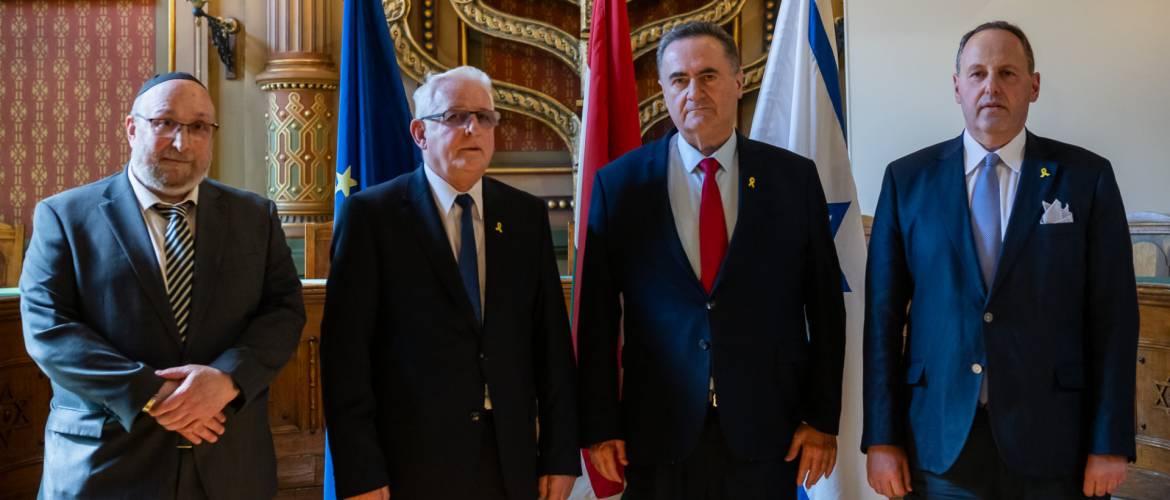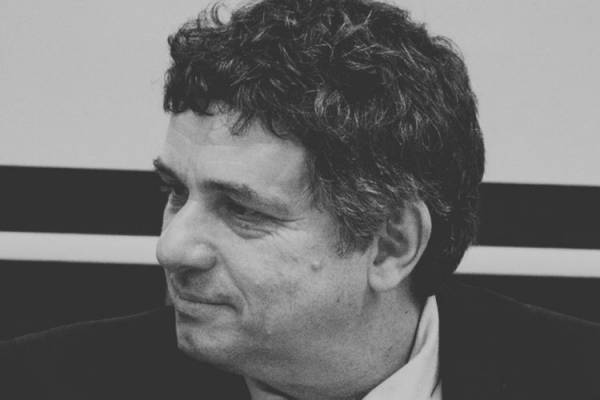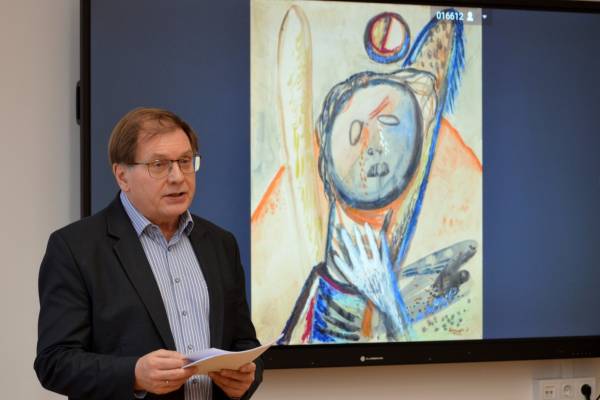The
support of Hungarian Jewry and the Hungarian government is very important to us,
stated Israeli Foreign Minister Israel Katz on an official visit to Budapest on
17 June. He had talks with Minister of Foreign Affairs Péter Szijjártó and discussions
with the representatives of the Hungarian Jewish denominations.
The
Israeli foreign minister and his entourage were welcomed at the entrance of the
Dohány Street synagogue by representatives of the Hungarian Jewish
denominations.
Israel
Katz was accompanied by the Israeli ambassador to Budapest, Yakov
Hadas-Handelsman and his deputy, Moran Birman, as well as by the foreign
minister's chief advisor, chief of staff, spokesperson and several political
advisors.
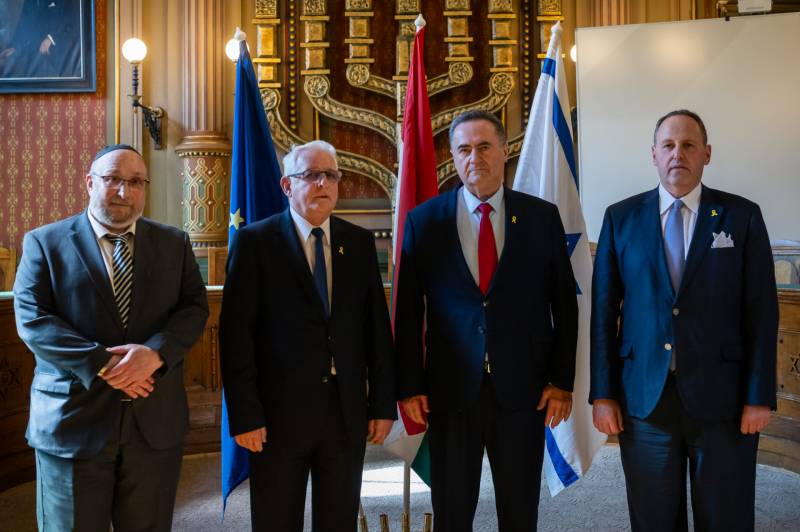 Dr. Róbert Frölich, Dr. Andor Grósz, Israel Katz, Tamás Mester
Dr. Róbert Frölich, Dr. Andor Grósz, Israel Katz, Tamás Mester
The
guests were received and greeted, among others, by Dr. Andor Grósz, president
of the Federation of Jewish Communities in Hungary - Mazsihisz, dr. Róbert
Frölich, National Chief Rabbi, Tamás Mester, president of the Budapest Jewish
Community (BZSH) and vice president of Mazsihisz, Gábor Keszler, president of
MAOIH, and Jonatán Megyeri, rabbi of EMIH.
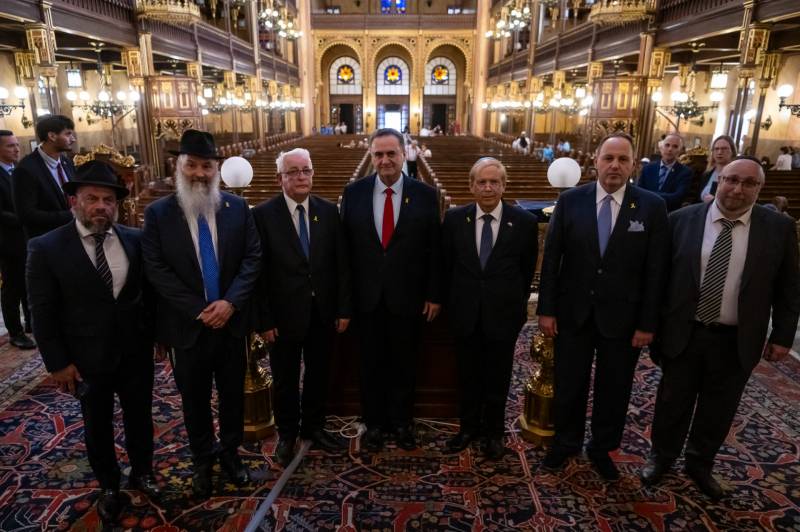 Jonatán Megyeri, Gábor Keszler, dr. Andor Grósz, Israel Katz, Jákov Hadas-Handelsman, Tamás Mester and dr. Robert Frölich
Jonatán Megyeri, Gábor Keszler, dr. Andor Grósz, Israel Katz, Jákov Hadas-Handelsman, Tamás Mester and dr. Robert Frölich
In the
synagogue, the minister listened to a lecture on the history of the temple and
talked with dr. Róbert Frölich about the Hungarian Jewish community. After
that, the delegation paid their respects at the Emanuel Memorial Tree, and then
the Minister of Foreign Affairs and his entourage continued to a meeting with
the Hungarian Jewish leaders in the ceremonial hall of the Síp Street
headquarters.
Dr.
Andor Grósz introduced the activities, institutional network and religious life
of Mazsihisz, the largest Hungarian Jewish denomination. He stressed that it
was a great honor that the Minister of Foreign Affairs visited the synagogue on
Dohány Street, as the building testifies on the one hand the prosperity that
the Hungarian Jewish community enjoyed before the Holocaust, and at the same
time embodies the fact that the descendants will carry on in a dignified way
the heritage, tradition and faith of their ancestors.
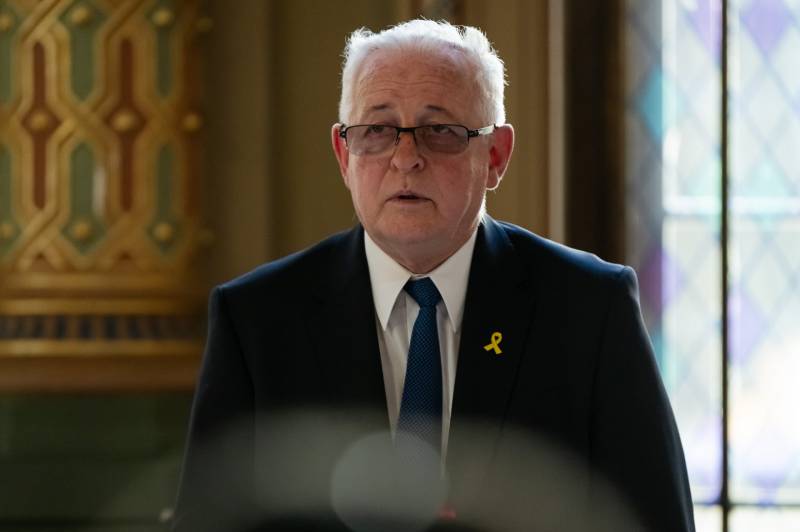 Dr. Andor Grósz
Dr. Andor Grósz
The
president of Mazsihisz explained that there are three Jewish denominations
operating in Hungary, and although there are differences of opinion between
them, when it comes to Israel and Judaism, the differences of opinion are immediately
put aside.
He added
as a proof of this cooperation that just a few days after the attack by Hamas
on October 7, a service and event of solidarity were held in the Dohány Street
synagogue in order to show support for Israel. The Hungarian head of state and
the leadership of the other two Jewish denominations also took part to the
event.
Dr.
Andor Grósz mentioned also that Mazsihisz and BZSH organized fundraising for
the Beeri Kibbutz after October 7th, and the President of the Federation handed
over the donation personally to the kibbutz representatives in Israel.
Reacting
to the president's words, Israel Katz stated that he was very happy to hear
that the Hungarian Jewish denominations united in support of Israel after the
seventh of October, as the support of Hungarian Jewry and the Hungarian
government is very important to them.
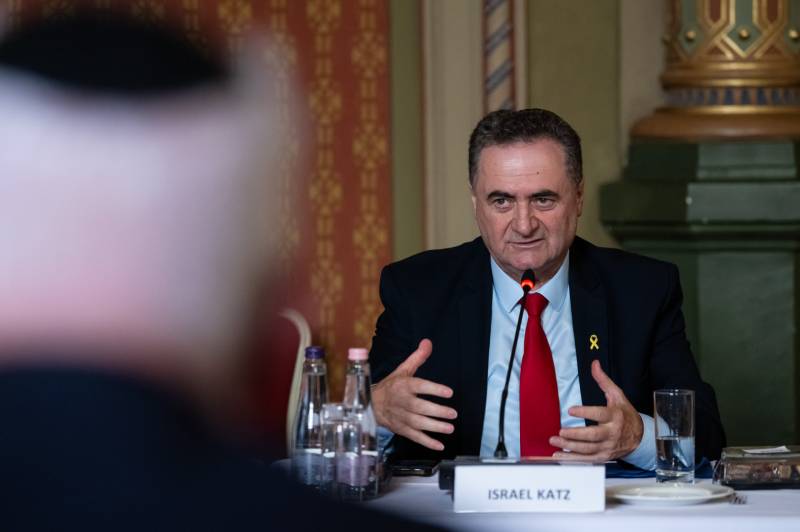
He
praised at length the Hungarian government's pro-Israel policy, and as he said,
Hungary was the only state in the European Union that consistently stood up for
Israel even against the other 26 member states. Israel Katz pointed out that it
was a big disappointment for him when a European politician told him something
different in private and something completely different in public, which is not
the case with his Hungarian colleague.
Referring
to the meeting with Péter Szijjártó, he pointed out that the main topic of his
visit to Budapest was related to the upcoming Hungarian EU presidency, and that
negotiations are necessary in this regard in order to determine how the country
and the Union will fight against the anti-Israel tendencies in the next six
months.
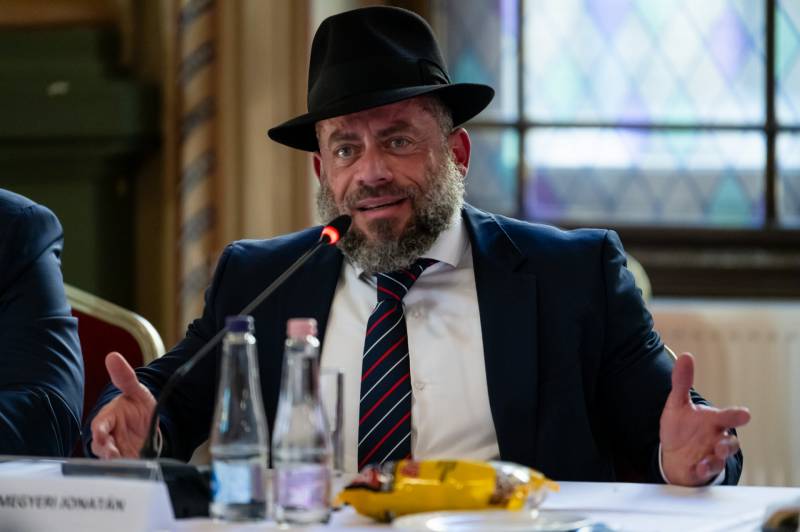 Jonatán Megyeri
Jonatán Megyeri
Jonatán
Megyeri, the rabbi of the EMIH, also welcomed the foreign minister, emphasizing
that Hungarian Jewry has a special responsibility to strengthen the country's
influence for the sake of Israel; while Gábor Keszler, the president of the
MAOIH, underlined, among other things that anti-Semitism has reached enormous
proportions in Europe and throughout the world, it has also flooded higher
education, so the leaders of Europe should issue a joint statement against
these alarming phenomenas.
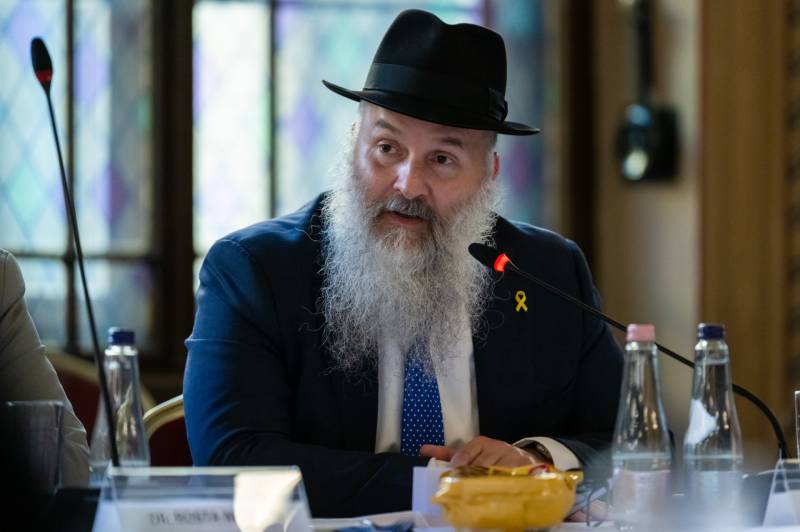 Gábor Keszler. Photos: P.T. / Mazsihisz
Gábor Keszler. Photos: P.T. / Mazsihisz

 02.27. 17:07, kimenete: 02.28. 18:12
02.27. 17:07, kimenete: 02.28. 18:12 


